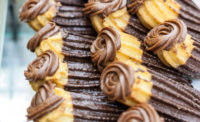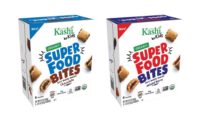As we begin to look toward 2020, we find Americans are becoming increasingly concerned about their own impact on planet earth. As they embrace more-sustainable habits and customs in their daily lives, they’ve begun to expect the same from the companies they support through food purchases, including the increasing number of snacks that factor into their daily diets.
We’re already seeing such a movement impacting foodservice. According to Mintel’s 2019 “Foodservice Trends” report, 46 percent of consumers say environmental responsibility is an important factor in their food choices. These same diners are incorporating environmental responsibility into how they choose where they enjoy breakfast, lunch, dinner—and the midday and late-night snacks that fill in the gaps. As more restaurants jump on the green bandwagon to attract more of this growing base of discerning customers, sustainability will become the “new normal,” predicts Mintel, and foodservice operators—and the snack producers and bakers supplying them—will need to take more innovative steps to stand out.
Americans consumed nearly 386 billion ready-to-eat snack foods in 2018, with the vast majority of those consumed between main meals, according to NPD Group’s “Future of Snacking” report. Even indulgent snack foods are staging a comeback by walking a line between health and enjoyment. The snack food industry has long packaged multiple customer demands in a single bar, bag or recyclable cup.
Indeed, today and in the future, snacking is about solving small problems for consumers, and those problems present opportunities for food marketers. Fully 95 percent of U.S. adults snack daily, and 70 percent do so twice or more times per day, making snacking a huge opportunity for connecting with consumers. The percentage of “super snackers” (those who snack four or more times per day) is increasing, and the fact that busy lifestyles result in the skipping of meals—or replacing meals with snacks—suggests snack frequency will continue to grow in the near term. Consumers seek a variety of things in any snack choice, meaning brands that effectively provide multiple solutions can flourish.
One company transcending the common solutions consumers demand from their snacks—satisfying flavor, convenient packaging, pleasant or intriguing mouthfeel, trust in ingredients, etc.—is Chicago-based ZENB. The company takes its name from the Japanese word zenbu, meaning “whole.” Staying true to its origins, ZENB manufactures plant-based snack bars featuring whole vegetables that include the high-fiber parts that often are discarded, such as seeds, peels and stems. In addition to organic vegetables, the products are made with other organic ingredients that augment and bring out the simple flavor of the vegetable, such as diced almonds, date and agave syrups, puffed brown rice and red quinoa, almond butter, and olive oil.
Along with the nutritional benefits of using the typically discarded vegetable parts and whole grains, the company is educating consumers about food waste and the importance of using as much of the vegetable as possible. Perhaps not coincidentally, ZENB’s practice tracks with one of the biggest trends driving menu choice in all foodservice segments right now: “plant forward,” or “veg centric.”
ZENB’s non-GMO Veggie Sticks are available in three varieties: Beet, made with the peel; Corn, from kernel to cob; and Red Bell Pepper, made with the stem and seeds and offering a slightly spicy kick. The vegetable snacks are available in counts of six, nine and 18; a variety pack mixes them up. Direct-to-customer shipping is in 100 percent recyclable boxes. One bar (or “stick”) contains 130–150 calories, 5–7 grams fat, 6–9 grams sugar, 3–4 grams protein and 3–5 grams fiber, depending on the variety.
The snack food industry has a lot of competition, but that’s OK, because the forecast for 2020 promises plenty of consumers to attract. How to attract and thus increase sales is the big question. Practicing and marketing a commitment to saving and preserving the planet is the latest arrow in any snack-manufacturer’s quiver to promote positive distinction.







